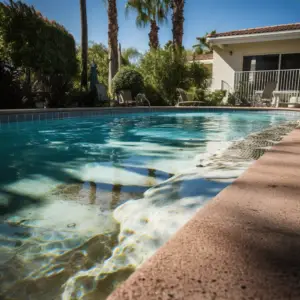Pool Water Loss, By all means, everyone loves a day out at the pool during that hot summer day. It may be for fun, a holiday, or relaxing with friends, but we agree that a pool adds a beautiful twist to a sunny day-out.
However, despite such enjoyment, pool care is always a challenge for most homeowners.
There are issues of debris, dirt, and even chemical imbalances. But 1 of the challenging questions remains,” Is your pool losing 1 inch of water daily?”. If you saw this occurring, then you are at the right place. Today we get to explore what causes the 1-inch of water loss and the best solutions to consider.
Table of Contents
How Much Water Loss in a Pool Is Average?

It’s understandable that over time, your pool is bound to lose water through natural evaporation. This is especially the case for pools that remain exposed without a cover. Such pools will often see water loss of up to a quarter-inch in measurements, especially during the summer.
Likewise, heated pools and pools with water fixtures like fountains will experience a faster rate of water evaporation due to such comp1nts.
But, while pools tend to lose water naturally, it is only to a quarter-inch level, except for hot and windy areas. Any water loss beyond the average quarter-inch water loss is a tell-tale sign of a potential leak in your pool.
Once you notice the water loss is beyond average or daily, it is always fit to consider the possible culprits behind your pool water loss scenarios.
Let’s look at some signs that your pool water loss might be due to a leak
Tell-Tale Signs Of A Potential Pool Leak
Wet Pool Area
A mushy or wet spot in the pool’s surrounding area or equipment pad is a surefire sign that you are working with a pool leak. Most of the time, such situations mean your pool could be leaking from underground, and the water sips to the soil surrounding the pool.
Cracked pool structures
An underground leak is also responsible for causing the potential damage of cracking your pool’s concrete structure plus tiles. Keep in mind, once underground leaks occur, they tend to shift the pool’s foundation enough to cause cracks at the base or sideways. Thus, if you see rifts inside the pool, you could be facing a potential leak.
Inconsistent Chemical levels
Chemical Imbalances are a red flag at how much your pool is exposed to foreign dirt or debris from underground leaks. So, if your pool leaks, the pool’s chemicals will drain too and leave an inconsistent chemical level from the normal levels.
Water-logged pool hardware
The pool’s hardware can also be a source of a leak, especially if the system has been under a constant workload. Top among the potential areas to check for leaks in your pool’s hardware are
The Main Drain
The pool’s main drain is at the heart of your pool system, and any leak from the structure can be challenging to repair. If the main drain is the source of the leak, you might have to contact a professional pool builder for locating and repairing.
Pool foundation and structure
Leaks in your pool’s foundation and structure are much easier to locate since it will only take you a visual inspection to find the source. However, some structural leaks can be hard to find, and as such, it is good to conduct a test to establish the right leak location.
The Skimmer
It also happens that the skimmer material, especially where it connects to the pool, can get damaged due to high pressure and begin dripping any water that passes through. This means you should always check the skimmer for damage first whenever you suspect a leak.
The Pool’s Return piping system
The return piping system can also be a potential source of a pool leak, especially if the piping goes underground. In case of the return piping leaks, the most common indication is damp ground around the pool.
Pool jets plus lights
Pool jets and lights can also be sources of leaks, especially since they offer openings inside the pool structure. With time, the watertight seals around the lights and jets wear off and start letting water through the damaged joint fixtures.
DIY Tests For Pool Leaks

The following tests are examples of what you can do and see whether the pool is leaking or whether evaporation is the real cause of the water loss.
Evaporation Test
Different geographical variables can affect the evaporation rate of your pool water. Remember that pools in hot and windy areas tend to lose more water naturally, indicating an average loss of half-inch of water loss. However, if you find that the evaporation rate is more( an inch or two), you should be concerned about more than the local weather.
Bucket Test
Here, you will get a five-gallon bucket of water and place it next to the pool. Take note of the water levels inside the bucket and the pool level. After 24 hours, you can come back and check if the water level inside the pool drops more than the bucket’s water level. Suppose the pool’s level is lower than the bucket’s, a possible pool leak is in place. Just be sure you do the test under a clear forecast to avoid inaccurate results.
Meter Test
If there is a plumbing leak in your pool, the ‘Meter Test’ comes in handy since it notes the water meter readings. All it takes is 30 minutes of no water use and taking the current water meter reading. Come back after 30 minutes and check the water meter to see if the numbers are the same as the initial reading. If the numbers did change, then you need a professional leak test.
Dye Test
The dye test will determine-+ a leak at either the bottom or side of your pool. You will use a few dye drops inside the pool and observe where the color flows. Naturally, the dye will flow towards the pool leak and indicate the location to fix it.
Final Words
If these tests don’t determine the answer to “Is your pool losing 1 inch of water daily?” then it’s probably time to get professional help.
With the professional pool service, specialized equipment and expertise combine to detect the slightest leaks in your pool. As a plus, you also get the proper help in basic repairs rather than doing all the complex work as a DIY job.


